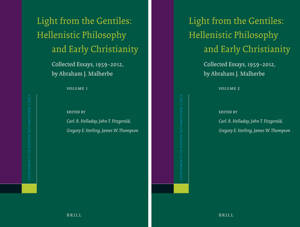
- Afhalen na 1 uur in een winkel met voorraad
- Gratis thuislevering in België vanaf € 30
- Ruim aanbod met 7 miljoen producten
- Afhalen na 1 uur in een winkel met voorraad
- Gratis thuislevering in België vanaf € 30
- Ruim aanbod met 7 miljoen producten
Zoeken
Light from the Gentiles: Hellenistic Philosophy and Early Christianity
Collected Essays, 1959-2012, by Abraham J. Malherbe
Abraham J Malherbe
€ 538,95
+ 1077 punten
Omschrijving
Rather than viewing the Graeco-Roman world as the "background" against which early Christian texts should be read, Abraham J. Malherbe saw the ancient Mediterranean world as a rich ecology of diverse intellectual traditions that interacted within specific social contexts. These essays, spanning over fifty years, illustrate Malherbe's appreciation of the complexities of this ecology and what is required to explore philological and conceptual connections between early Christian writers, especially Paul and Athenagoras, and their literary counterparts who participated in the religious and philosophical discourse of the wider culture. Malherbe's essays laid the groundwork for his magisterial commentary on the Thessalonian correspondence and launched the contemporary study of Hellenistic moral philosophy and early Christianity.
Specificaties
Betrokkenen
- Auteur(s):
- Uitgeverij:
Inhoud
- Aantal bladzijden:
- 1024
- Taal:
- Engels
- Reeks:
- Reeksnummer:
- nr. 150
Eigenschappen
- Productcode (EAN):
- 9789004253391
- Verschijningsdatum:
- 25/11/2013
- Uitvoering:
- Hardcover
- Formaat:
- Genaaid
- Afmetingen:
- 163 mm x 239 mm
- Gewicht:
- 2041 g

Alleen bij Standaard Boekhandel
+ 1077 punten op je klantenkaart van Standaard Boekhandel
Beoordelingen
We publiceren alleen reviews die voldoen aan de voorwaarden voor reviews. Bekijk onze voorwaarden voor reviews.








